Serving 532 students in grades Kindergarten-8, Galileo Elementary Math & Sci Schol Acd ranks in the top 30% of all schools in Illinois for overall test scores (math proficiency is top 30%, and reading proficiency is top 30%).
The percentage of students achieving proficiency in math is 35-39% (which is higher than the Illinois state average of 28%). The percentage of students achieving proficiency in reading/language arts is 37% (which is higher than the Illinois state average of 30%).
The student:teacher ratio of 13:1 is equal to the Illinois state level of 13:1.
Minority enrollment is 89% of the student body (majority Hispanic), which is higher than the Illinois state average of 55% (majority Hispanic and Black).
Quick Stats (2025)
- Grades: Kindergarten-8
- Enrollment: 532 students
- Student:Teacher Ratio: 13:1
- Minority Enrollment: 89%
- Overall Testing Rank: Top 30% in IL
- Math Proficiency: 35-39% (Top 30%)
- Reading Proficiency: 37% (Top 30%)
- Science Proficiency: 55-59% (Top 50%)
- Source: National Center for Education Statistics (NCES), IL Dept. of Education
School Overview
Galileo Elementary Math & Sci Schol Acd's student population of 532 students has declined by 5% over five school years.
The teacher population of 41 teachers has grown by 24% over five school years.
Grades Offered
Grades Kindergarten-8
Total Students
532 students
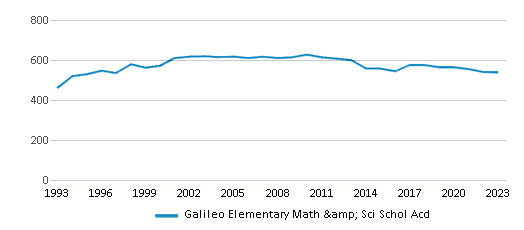
Gender %
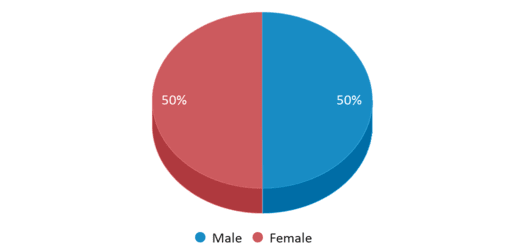
Total Classroom Teachers
41 teachers
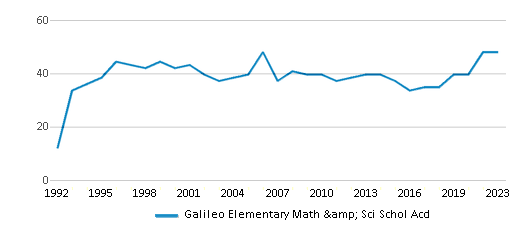
Students by Grade
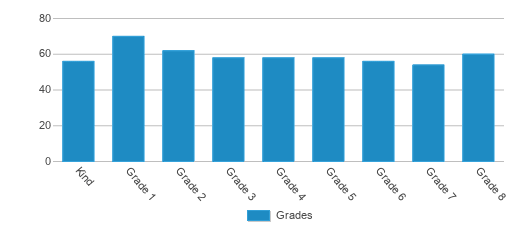
School Rankings
Galileo Elementary Math & Sci Schol Acd ranks within the top 30% of all 3,426 schools in Illinois (based off of combined math and reading proficiency testing data).
The diversity score of Galileo Elementary Math & Sci Schol Acd is 0.62, which is less than the diversity score at state average of 0.70. The school's diversity has stayed relatively flat over five school years.
Overall Testing Rank
#762 out of 3426 schools
(Top 30%)
(Top 30%)
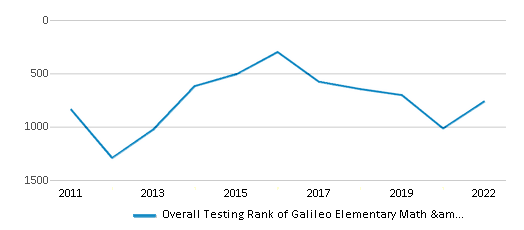
Math Test Scores (% Proficient)
(20-21)35-39%
28%
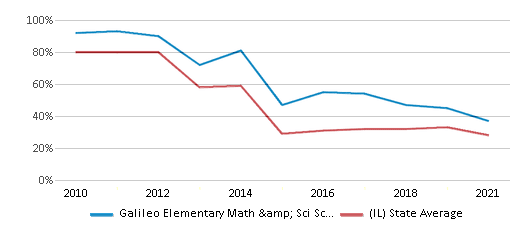
Reading/Language Arts Test Scores (% Proficient)
37%
30%
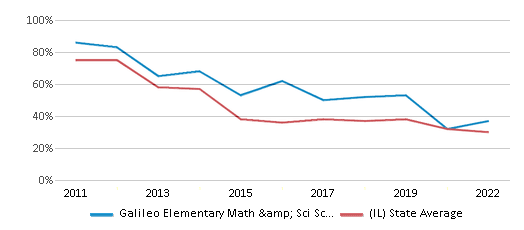
Science Test Scores (% Proficient)
55-59%
50%
Student : Teacher Ratio
13:1
13:1
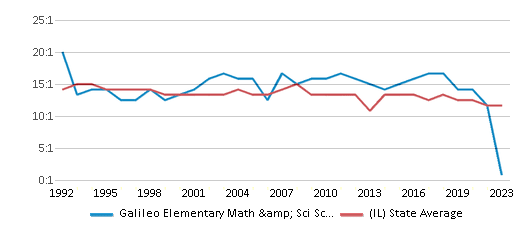
American Indian
n/a
1%
Asian
3%
6%
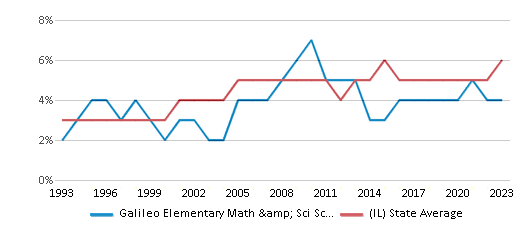
Hispanic
56%
28%
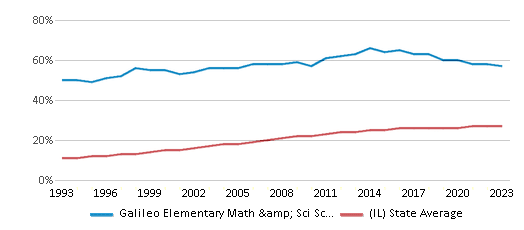
Black
25%
16%
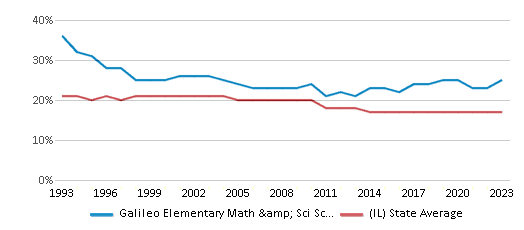
White
11%
45%
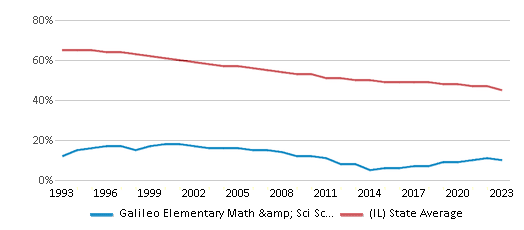
Hawaiian
1%
n/a
Two or more races
4%
4%
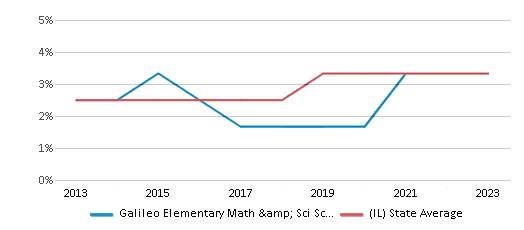
All Ethnic Groups
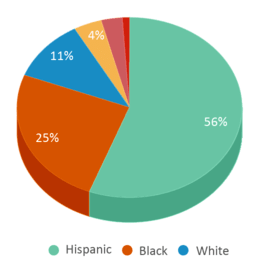
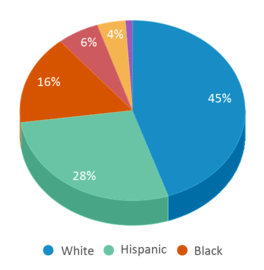
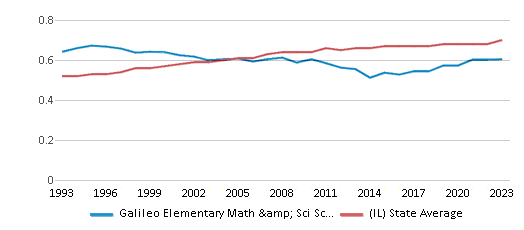
Eligible for Free Lunch
68%
43%
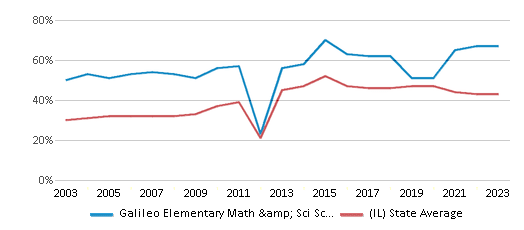
Eligible for Reduced Lunch (13-14)
13%
3%
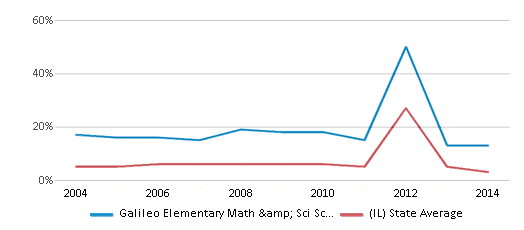
School Statewide Testing
School District Name
Source: National Center for Education Statistics (NCES), IL Dept. of Education
Profile last updated: 02/09/2025
Frequently Asked Questions
What is Galileo Elementary Math & Sci Schol Acd's ranking?
Galileo Elementary Math & Sci Schol Acd is ranked #762 out of 3,426 schools, which ranks it among the top 30% of public schools in Illinois.
What schools are Galileo Elementary Math & Sci Schol Acd often compared to?
Galileo Elementary Math & Sci Schol Acdis often viewed alongside schools like Chicago World Language Academy by visitors of our site.
What percent of students have achieved state testing proficiency in math and reading?
35-39% of students have achieved math proficiency (compared to the 28% IL state average), while 37% of students have achieved reading proficiency (compared to the 30% IL state average).
How many students attend Galileo Elementary Math & Sci Schol Acd?
532 students attend Galileo Elementary Math & Sci Schol Acd.
What is the racial composition of the student body?
56% of Galileo Elementary Math & Sci Schol Acd students are Hispanic, 25% of students are Black, 11% of students are White, 4% of students are Two or more races, 3% of students are Asian, and 1% of students are Hawaiian.
What is the student:teacher ratio of Galileo Elementary Math & Sci Schol Acd?
Galileo Elementary Math & Sci Schol Acd has a student ration of 13:1, which is equal to the Illinois state average of 13:1.
What grades does Galileo Elementary Math & Sci Schol Acd offer ?
Galileo Elementary Math & Sci Schol Acd offers enrollment in grades Kindergarten-8
What school district is Galileo Elementary Math & Sci Schol Acd part of?
Galileo Elementary Math & Sci Schol Acd is part of Chicago Public Schools Dist 299 School District.
In what neighborhood is Galileo Elementary Math & Sci Schol Acd located?
Galileo Elementary Math & Sci Schol Acd is located in the Little Italy neighborhood of Chicago, IL. There are 4 other public schools located in Little Italy.
School Calendar
View the Galileo Elementary Math & Sci Schol Acd yearly calendar below. Note key dates such as:
Event
Date
No School - Spring Break!
March 24, 2025 (Monday)
Last Day of School!
June 12, 2025 (Thursday)
First Day of School!
August 18, 2025 (Monday)
Last Day of School!
June 04, 2026 (Thursday)
School Reviews
1 3/31/2021
We have been here for 5 years. Started great but now my child hates school. Doesn't like her teachers. Their lack of communication is frustrating. It seems our once positive school experience has turned negative. The teachers here failed us.
Review Galileo Elementary Math & Sci Schol Acd. Reviews should be a few sentences in length. Please include any comments on:
- Quality of academic programs, teachers, and facilities
- Availability of music, art, sports and other extracurricular activities
Recent Articles

What Is A Charter School?
Explore the world of charter schools in this comprehensive guide. Learn about their history, how they operate, and the pros and cons of this educational innovation. Discover key facts about charter schools, including admission policies, demographics, and funding, as well as what to look for when considering a charter school for your child.

10 Reasons Why High School Sports Benefit Students
Discover the 10 compelling reasons why high school sports are beneficial for students. This comprehensive article explores how athletics enhance academic performance, foster personal growth, and develop crucial life skills. From improved fitness and time management to leadership development and community representation, learn why participating in high school sports can be a game-changer for students' overall success and well-being.

February 05, 2025
Understanding the U.S. Department of Education: Structure, Impact, and EvolutionWe explore how the Department of Education shapes American education, from its cabinet-level leadership to its impact on millions of students, written for general audiences seeking clarity on this vital institution.





